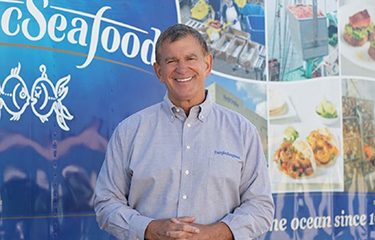Clackamas, Oregon, U.S.A.-based Pacific Seafood has stressed the bona fides of its domestic labor force in its latest social responsibility report.
Pacific’s sixth annual Corporate Social Responsibility Report, released 28 March, said the company increased its sustainability efforts, supported groundbreaking research, forged new partnerships, and added more team-member benefits in 2022.
“We doubled down on our commitment to sustainability efforts,” Dulcich said in the introduction to the report. “At Pacific Seafood, we define excellence as ‘Consistently doing your best and always striving to do better.’ What excellence means is doing your best every day to meet the needs of our customers and consumers. The past year was one of significant transformation, and we’re just getting started.”
Pacific operates 40 facilities across the United States and Canada. It said it is required to adhere to labor standards set by the U.S. government, in comparison to other seafood processors that operate in countries with looser or fewer labor regulations.
“Sustainability starts with our team members. All Pacific Seafood owned facilities are in full compliance with U.S. and local labor laws. We also require our suppliers to be in compliance with all human rights laws, including, without limitation, prohibitions on child labor, slavery, and human trafficking, in the countries in which it does business,” the company said. “Our suppliers are subject to random inspections by our team members to ensure compliance.”
Pacific Seafood’s doubled its environmental, health, and safety team to four members in 2022, and launched a full tuition grant program for all of its employees in partnership with the University of Arizona Global Campus and George Fox University.
Concurrently, Pacific launched its own online learning platform, Pacific Seafood University, as part of its "Team Blue" effort to develop its frontline workers into administrators and encourage internal promotion within the company.
In another educational endeavor, Pacific teamed with Oregon State University’s Seafood Research and Education Center on a project researching the benefits fo fish skin in treating wrinkles. The project found evidence skin gelatin from Pacific whiting can prevent skin wrinkling caused by ultraviolet rays.
Pacific's bio products division also made a research breakthrough, finding feeding dried waste from surimi production to chickens enriched their edible tissues and boosted their omega-3 fatty acid content.
The company's environmental efforts were led by its partnership with the PAC-12 college sports conference to host the first-ever large-conference game to be carbon-neutral, through the purchase of carbon offsets sold by United Green Energy.
And the company saved over a million kilowatt hours of electricity through the replacement of older lightning with LED bulbs, reducing its energy usage at its Quilcene facility by 75 percent.
“As part of our mission, ‘feeding the world the healthiest protein on the planet,’ we reimagined how to make seafood more widely available across the United States,” Dulcich said. “Thanks to our work with the USDA’s procurement program, more families and their children have access to Pacific’s healthy proteins than ever before.”
Photo courtesy of Pacific Seafood







